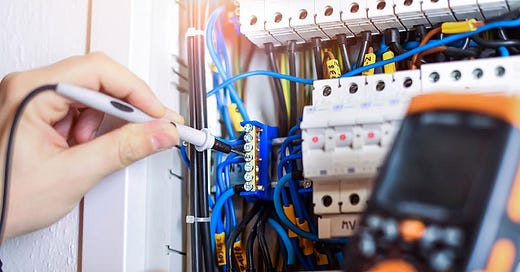What is an Electrical Installation? A Complete Guide
In every modern building—residential, commercial, or industrial—electrical systems form the backbone of daily operations. From lighting and appliances to heating, air conditioning, and communications, electricity powers it all. That’s why understanding what an electrical installation entails is crucial, especially if you're building, renovating, or upgrading a property.
An electrical installation includes the complete network of electrical wiring, equipment, and components that distribute electricity safely and efficiently throughout a space. Done correctly, it ensures the reliable flow of power, meets legal safety codes, and supports the future needs of any structure.
Why Electrical Installations Matter in Livonia, MI
In Livonia, MI, where homes range from mid-century builds to newer developments, ensuring your electrical system is up to date is more than just a safety concern—it’s a necessity. As technology advances, so does the demand for power. Older homes often lack the capacity to support modern appliances, smart systems, and electric vehicle chargers without upgrades.
A properly designed and installed electrical system ensures your home or business remains functional, efficient, and compliant with Michigan’s electrical codes. With unpredictable weather in the region, dependable power delivery also helps prevent system failures and hazards.
What Is Included in an Electrical Installation?
An electrical installation goes far beyond simply wiring a light or adding an outlet. It encompasses the full design, placement, and connection of a wide variety of components, including:
Wiring and circuits
The backbone of the system that distributes power from the main service panel to every outlet, light, and appliance.Main electrical panel and breakers
Controls the flow of electricity and provides overload protection to prevent fires and equipment damage.Lighting systems
Both interior and exterior lighting for function, ambiance, and security.Outlets and switches
Strategically placed for convenience and safe use, according to code.Grounding and bonding
Ensures that electrical current is safely directed into the ground in case of a fault.Special systems
These may include data cabling, backup generators, surge protection, and energy-efficient upgrades like solar panel integration.
Each part must be carefully installed by a qualified electrician to ensure long-term performance and safety.
Types of Electrical Installations
There are different types of installations, each with its own design requirements and regulations:
1. Residential Installations
These focus on homes, apartments, and multi-family buildings. They include power for lighting, kitchen appliances, HVAC systems, entertainment systems, and personal electronics.
2. Commercial Installations
Typically more complex, commercial projects require power for lighting, HVAC, office equipment, security systems, and sometimes industrial machinery.
3. Industrial Installations
Heavy-duty electrical systems are needed for factories, manufacturing plants, and warehouses. These often involve three-phase power, high-voltage systems, and complex safety protocols.
4. Outdoor and Specialized Installations
Including parking lot lighting, signage, electric vehicle charging stations, and alternative energy solutions.
When Do You Need a New Electrical Installation?
Here are a few scenarios where a new or upgraded electrical system becomes necessary:
New construction – Every new home or commercial building needs a custom electrical installation.
Home renovations – Remodeling a kitchen, bathroom, or basement often requires updating wiring and circuits.
Panel upgrades – If your current system can’t handle your power demands, a new electrical panel may be needed.
Safety concerns – If your breakers trip frequently, lights flicker, or outlets feel warm, it's time for a professional inspection.
Code compliance – Homes with outdated systems often need upgrades to meet current electrical codes and insurance requirements.
The Role of a Licensed Electrician
Electrical installations are not DIY projects. They require a deep understanding of electrical systems, local building codes, and safety practices. A licensed professional ensures your installation is done right the first time—avoiding the risk of fire, electrocution, or costly repairs later.
Working with a trusted company like C&J Electrical Services ensures that all work is performed by certified electricians who follow industry standards, use high-quality materials, and stand behind their work.
Final Thoughts
Understanding what an electrical installation involves can help you make smarter decisions when building, renovating, or upgrading your home or business. A well-designed system provides more than just power—it offers safety, efficiency, and future-proofing for the growing demands of modern living.
For property owners in Livonia, MI, a quality electrical installation is essential to keeping up with technology and protecting your investment. Whether you’re starting fresh or improving an existing system, hiring a qualified professional is the safest and most effective way to get the job done right.
Frequently Asked Questions
1. How long does an electrical installation take?
For a single-family home, it typically takes between 3 to 10 days, depending on complexity and inspection schedules.
2. How much does a full electrical installation cost?
Costs vary based on property size and type. Residential installations can range from $3,000 to $10,000 or more.
3. What’s the difference between wiring and an electrical installation?
Wiring is just one component. An electrical installation includes wiring, outlets, panels, breakers, and more.
4. Do I need a permit for electrical work in Livonia, MI?
Yes. Any significant electrical work requires permits and inspections to ensure compliance with Michigan codes.
5. Can I upgrade just my panel without rewiring the entire home?
In some cases, yes—but it depends on the condition and capacity of the existing wiring. A licensed electrician can evaluate and advise accordingly.



